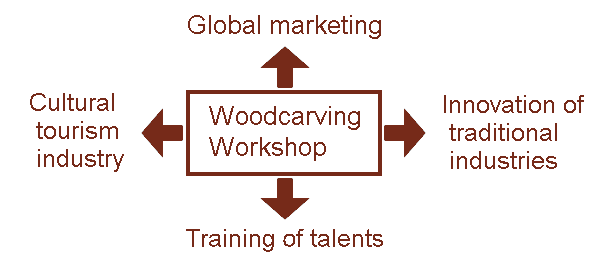|
Since
I was a child, I had strong interest in painting. After
I graduated from junior middle school, my parents wanted
me to continue to develop in the industry of
woodcarving, so I took Shui-mu You as my teacher, a
famous Lukang woodcarving master.
My teacher was very strict and deemed that a solid
foundation was very significant. In the first month, I
carved flower patterns by bare hands. After that he
taught me how to use knives. At the beginning, I often
hurt my hands. Two months later, my teacher started to
teach me how to use a triangle knife. After a week of
internship, I started to carve ancestral tablets,
baldachines, and flower patterns. Four months after, my
teacher considered it was time to teach me fine relief.
Stabbing my hands was common. For anything I did not
understand, I'd consulted my teacher and senior
apprentices. And I often observed the patterns of
woodcarving in temples and learned about the carving
skills.
In
the past, one should learn woodcarving from ancestral
tablets, baldachines, and flower patterns as the foundation
and also know a bit about woodwork, paint, and gold foil.
After that, he could be flexible in carving sedan chairs for
deities, Han flower patterns, and temple decoration,
followed by other decorative flower patterns, armchair
flower patterns, and characters.
I
was fortunate to finish my apprenticeship in one year. Some
senior peers had to wait for three years and four months
years to do so. At about 20 years old, I worked at a
woodcarving company dedicated to carving Japanese-style
grid. I often referred to and learn from the carving skills
and works of my colleagues and drew inferences about other
cases from one instance. After about 10 years,
Japanese-style grid became less popular. At the age of 30, I
began to operate a woodcarving factory with broader and more
diversified operation. During my spare time, I taught
apprentices. The businesses of the woodcarving factory were
mainly fine wood woodcarving and wooden decoration for
traditional architecture and religious furniture. It has
complete procedures from the design of drawings, layout,
carving by hands, and semi-mechanical manufacturing.
During my
40 years engagement in woodcarving, I have integrated
traditional carving skills with modern design to create
works with my personal style and look forward to
experiencing deeper in life. Culture stands for the
accumulation of art and life experience of a country and
provides resources to memory and image. Modern culture can
be a life or an economy. It integrates culture with
inspiration to produce creative outputs so as to bring about
new development and commercial opportunities to us. As for
future planning, I hope to start from traditional industries
to develop cultural tourism industry. I want to sells my
works to global markets and pass my skills down.

|